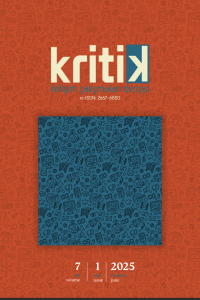Abstract
Panopticon, which means "Surveilling the Whole", refers to the surveillance society. Panopticon is an environment where the minority watches and controls the majority. Today, the surveillance society, called the "digital panopticon" by Chul Han, is a digital platform where everyone watches and is watched over each other at their own will. Exposure in the digital world has become a daily practice and normalized. Voluntarily exposed people in the digital surveillance society enjoy freedoms. The concepts of control and freedom are intertwined; freedoms are taken under control. In the name of freedom, the individual has become addicted to exposing himself and enjoying the surveillance of the crowd. This society of spectacle is also a society of pleasure. He is doomed to live a pleasure-oriented life, dependent on the show.
In a consumer society, a person who goes with the flow without stopping to think becomes part of a mass that consumes and thinks about the same things offered by the culture industry. In the consumer society, communication madness is an addiction. Because in the digital world, there is a constant need for approval. The individual feels that he belongs to this environment where he receives approval and develops a sense of belonging. Thus, users who move away from warm communication tend to communicate within the framework of applications created by digital technologies, which are cold communication methods. There is no room for negativity in these types of methods; in case of any negativity, the connection is cut off. In this respect, although technological communication methods are seen as freedom, lack of communication emerges as the need for approval. The need for approval is expressed through self-exposure. Technology use has now turned into an addiction to approval. As communication decreases, exposure and approval through self-display increases. In the echo chamber, this cycle continues and addiction increases. Along with exhibitionism, voyeurism has become a culture. Even though we do not see ourselves in this cycle, we are actually all in this cycle. Since we are slaves to voyeurism and being stared at, exhibitionism has become normal for us. Addiction to exhibition has become a culture.
Keywords
References
- Adorno, T., Kültür Endüstrisi Kültür Yönetimi, (Çev: Nihat Ülner, Mustafa Tüzel, Elçin Gen), İletişim Yayınları, İstanbul 2007.
- Alper, H., (2022). Psikopolitika ve Özgürlüğün Krizi, TRT Akademi, 7(14), 325-338.
Abstract
‘’Bütünü Gözetlemek’’ anlamına gelen Panoptikon, gözetim toplumunu ifade etmektedir. Panoptikon azınlığın çoğunluğu izlediği ve denetlediği bir ortamdır. Günümüzde Chul Han tarafından “dijital panoptikon” olarak adlandırılan gözetim toplumu ise herkesin birbirini kendi istekleriyle gözetlediği ve gözetlendiği bir dijital platformdur. Dijital dünyadaki teşhir gündelik bir pratik haline gelmiş, normalleşmiştir. Dijital denetim toplumundaki kendi istekleriyle ifşa olan insanlar özgürlüklerten yararlanmaktadır. Denetim ve özgürlük kavramları içiçe girmekte; özgürlükler denetim altına alınmaktadır. Özgürlük adı altında birey kendini teşhir ederek kalabalıkların gözetlemesinden zevk alma bağımlısı haline gelmiştir. Bu gösteri toplumu haz toplumudur da. Gösteriye bağımlı bir şekilde haz odaklı yaşamaya mahkumdur.
Tüketim toplumunda durup düşünmeden akışa kapılan insan kültür endüstrisinin sunduğu aynı şeyleri tüketen ve düşünen bir kitlenin parçası olur. Tüketim toplumunda iletişim çılgınlığı bir bağımlılıktır. Çünkü dijital dünyada sürekli bir onay alma durumu söz konusudur. Birey onay aldığı bu ortama kendini ait hisseder, aidiyet geliştirir. Böylelikle sıcak iletişimden uzaklaşan kullanıcılar daha çok soğuk iletişim yöntemi olan dijital teknolojilerin oluşturduğu uygulamalar çerçevesinde iletişim kurmaya yönelir. Bu çeşit yöntemlerde olumsuzluğa yer yoktur, her hangi bir olumsuzluk durumunda bağlantı kesilir. Bu yönüyle teknolojik iletişim yöntemleri özgürlük gibi görülse de iletişim eksikliği onay alma ihtiyacı olarak ortaya çıkar. Onay alma ihtiyacı ise kendini teşhir etme ile davranışa dökülür. Teknoloji kullanımı artık bir onay alma bağımlılığına dönüşmüştür. İletişim azaldıkça kendini sergileme yoluyla teşhir ve onay alma artmaktadır. Yankı odasında bu döngü devam eder, bağımlılık artar. Teşhircilikle birlikte dikizleme bir kültür haline gelmiştir. Kendimizi bu döngü içerisinde görmesek de aslında hepimiz bu döngünün içinde bulunmaktayız. Dikizleme ve dikizlenmenin esiri olduğumuz için teşhircilik bizler için normalleşmiştir. Sergileme bağımlılığı bir kültür olmuştur.
Keywords
References
- Adorno, T., Kültür Endüstrisi Kültür Yönetimi, (Çev: Nihat Ülner, Mustafa Tüzel, Elçin Gen), İletişim Yayınları, İstanbul 2007.
- Alper, H., (2022). Psikopolitika ve Özgürlüğün Krizi, TRT Akademi, 7(14), 325-338.
Details
| Primary Language | Turkish |
|---|---|
| Subjects | Communication and Media Studies (Other) |
| Journal Section | Makaleler |
| Authors | |
| Early Pub Date | June 30, 2025 |
| Publication Date | June 30, 2025 |
| Submission Date | May 17, 2024 |
| Acceptance Date | April 8, 2025 |
| Published in Issue | Year 2025 Volume: 7 Issue: 1 |
Journal of Critical Communication © 2018 by Nuri Paşa Özer is licensed under Creative Commons Attribution-NonCommercial 4.0 International


